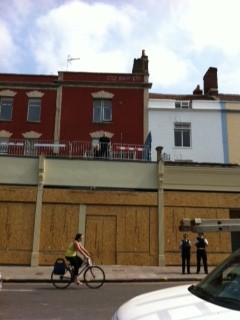I have been campaigning since February 2010 for No Tesco in Stokes Croft so imagine my mixed feelings when I woke up on Good Friday to hear the newly-opened supermarket had been “trashed”.
Alerted by friends in Stokes Croft, my first response was to gather information, with a Twitter search leading to several eye-witness accounts.
This blog by Neurobonkers.com described the dramatic effect of 160 riot police turning up on the streets – the tone bemused rather than partisan.
While giving a sense of folly on both sides, this blog by Oli Connor also questions the role of riot police in aggravating tension.
Jonathan Taphouse tells the story behind his photographs in the Guardian, and some turning-point moments.
Twitter helped me spot churnalism in action -the newspapers that repeated almost verbatim the police’s (understandly one-sided) press release, while this blog sums up the spin.
I was obsessed with gathering information and analysing its angles – media studies in action.
I wanted to piece it all together: what happened on the 21 April?
A volatile situation from the word go: a warm April night at the start of a bank holiday in a busy social area of the city.
Riot police turn up at 9 pm, some on horseback, some with dogs, and – according to Green councillor candidate, Gus Hoyt, on his way home – at least three with guns, one directing traffic with the gun, its holster strapped to his leg (Gus asked, “Is it real?” and “Of course it is, mate, where have you been living?” said the armed policeman).
The police raided Telepathic Heights, the squat opposite the newly-opened supermarket in Stokes Croft, looking for alleged petrol bombs.
(Surely a house squatted is better than left empty?).
This video includes interviews with squatters and eye-witness onlookers. As one pointed out, if you were conducting a drugs raid, you would send in uniformed police, and explain the situation to the neighbours.
But nothing was explained. The police operation seemed disproportionate and unnecessary military. I feel sorry for local police because this operation counters their good work in the community.
The drama was dramatically-lit by the searchlight from the police helicopter – its noise drew locals on to the streets to see what was happening.
Some reacted with the same fear-fight knee-jerk response that must affect the police; threatened, tribal, flooded with adrenaline.
Some of my fellow No Tesco campaigning friends who lived on a nearby street (which ended up kettled by riot police) tried to stop onlookers from grabbing stones from a skip and building barricades.
How quickly a scene turns raw. A push, a shove, a bottle thrown. The police have methods to deal with affray and are allowed to use force.
This video that shows Stokes Croft locals trying to quell the fight reaction from people feeling threatened.
“Stay calm and film everything. Do not instigate,” repeats a strong voice. Wise words.
The police left an empty police van outside Tesco and departed. That’s when a group of people spontaneously starting dismantling Tesco and smashing its windows. As one blogger reported: “The Tesco store – the very one the police operation had supposedly been set up to protect – had its front trashed.”
I am scared by violence and abhore it. I believe the ends do not justify the means. The means – the way we do things – is vital. We must create a peaceful society by enacting it.
Yet history tells us (the 1831 Bristol riots for vote reform, votes for women, the poll tax) that sometimes it takes violence from the voiceless to be heard. And damn it, violence is news – look at the media coverage that that night got.
Some violence is misplaced fighter-energy. I was in Stokes Croft in the early hours of 29 April, a week after the Tesco riot.
Eye-witnesses present on both nights told me that the police were calmer and less-reactive the second time, despite opportunistic bottle-throwing.
Stokes Croft had become – in a week – a magnet for fight-action. As I walked towards the epicentre, guided by the police helicopter’s beam, several masked and hooded lads passed me.
“Put the bin down, Bin Man!” shouted one of my fellow campaigners. The youth carrying the wheelie recycling bin put it down and we clapped to reinforce good behaviour.
Considering how hard-won the battle was for recycling, I would hate recycled bottles to come into disrepute as potential weapons.
Talking about recycling: Tesco has asked councils to remove their bins from Tesco car parks, depriving local councils of recycling revenue.
Tesco – which recently made profits of £3.8 billion – is taking the bins in-house.
A Tesco may be a convenient, clean shop but it also a powerful multinational that puts profit before everything. It may be staffed by good people but its policies are destroying small farms and the land, small businesses and local communities – while, according to UK Uncut, evading tax.
“If you don’t like Tesco, don’t shop there. Then they will close down,” some say.
But it is not that simple.
Tesco can afford to run its shops at a loss while local businesses start to fail. It’s hard to boycott Tesco if there are only a few food shops left.
In our unofficial role as peacekeepers last Friday we walked round the back of Tesco to see if the security guards were alright. On that surreal night of unexpected scenes at every street corner, we chatted through the steel fence. There was banter and good wishes expressed – this battle was not personal.
We walked round to Cheltenham Road.
Road block: riot van, riot police, police dogs, tension but also a kind of calm because there was no bottle throwing or police charging. The police helicopter whirred overhead. I heard a policeman explain to a girl expressing annoyance at the intrusion that he was normally on the beat and not a riot police.
I reported on Twitter (and had corroborated by another Tweeter): a tearful girl was helped by a policeman after being hurt by another. I wrote: “It’s not all black and white in Stokes Croft.”
Every side has its goodies and baddies.
The grey, nuanced bits are the compelling drama of a riot: the untamed rawness of chaos.
I wish I could channel that elemental energy into good cause and creativity.
Last Wednesday (between the two nights of disturbances), I was interviewed for the Politics Show about whether Tesco should reopen.
My answer: Tesco should never have opened in the first place. A council duped (the original planning permission was achieved anonymously) and so flawed that campaigners mounted a judicial review.
A local woman walking past joined us. She said she liked Tesco and shopped there and resented the rioters for setting a bad example to her son.
We chatted. We were both upset by the smashing of the Salvation Army and other local shops caught in the crossfire.
She said: you should open a shop to rival Tesco’s and sell fruit and veg wholesale.
I said that’s what we want to do: set up a food co-op and sell affordable healthy food with volunteers doing four hours a month.
(Nor is Tesco cheaper than local shops anyway, according to our survey).
She said: I’d volunteer every day for such a shop.



